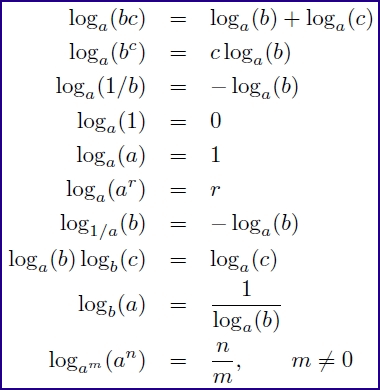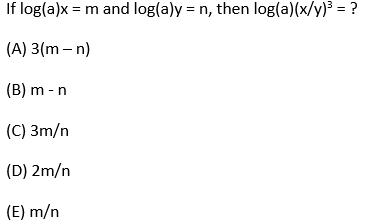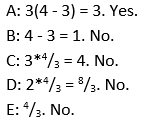

Logarithms are not incredibly common on the ACT, but you are likely to see one, or maybe two, amongst the harder problems on the ACT Math test, so if you are shooting for a top score on ACT Math, logarithms are worth knowing.
A logarithm is the power to which a number must be raised in order to produce some other number.
If you went, “Huh?” I don’t blame you.
But you probably know about exponents:
If we see 3 2 , we know this is 3 x 3, which equals 9.
If we see 4 5 , we know this is 4 x 4 x 4 x 4 x 4, which equals 1024.
Logarithms are all about thinking about exponents in a different way.
Here’s the question logarithms answer: What is the power something is raised to in order to get a number that we know?
So let’s say we are trying to figure out what power 3 must be raised to to get 9. Well, we just figured that out above: it’s 2. And what if we are trying to figure out what power 4 must be raised to in order to get 1024? Again, we saw this above, it’s 5.
This brings us to the mathematical definition of a logarithm:

If logab = c, then a c = b
So you need to remember, “What power do I need to raise a to to get b?
Using our example above, what does log41024 = ______?
Hopefully, you said 5.
Now try this one:
(think to yourself what power do I need to raise 2 to to get 64?)
The answer is 6. 2 6 = 64.
If you find logarithms super-strange looking, you’re definitely not alone! As we’ve seen, we’re used to working with exponents in a format like y = x a . In “logs” that equation is equal to logx(y) = a. Or, looking at an example with actual numbers: 3 2 = 9 is the equivalent of log3(9) = 2
We would read the logarithm out loud as “log-base 3 of 9 equals 2.” A helpful way to remember this is to notice that whatever is on the other side of the equals sign is the exponent, and that the tiny number is the exponent base.
If you have a scientific or graphing calculator, your calculator has a log button. But this log button only calculates bases of ten (log10). So one more important trick to remember about logs that will help you quickly convert logs of any base to ones you can plug in your calculator is the change of base rule. Here is is:
Logba = log a / log b (a base of 10 is implied when it is not written).
So if you see log48, you can convert this to log 8 / log 4 and plug this in your calculator to get the answer 3/2. Which if you check it back in the problem, it makes sense: 4 3/2 = 8.
For more info on mastering logarithms, check out the video below!
For your studying ease, here’s a complete list of logarithm rules (most of these will already be familiar to you from your study of exponents).

We can talk about logarithms until we’re blue in the face, but it’s pretty pointless without some practice!
Translate the exponents to logs and the logs to exponents:
Now, solve a few logarithms for the missing info:
As long as you know your exponent rules, you should have no problem with logarithms! The answers to these questions are:
One way to study these is to make flashcards with half of the equation of the front, and the other half on the back. Knowing these by sight will save you time on test day, since you won’t have to convert the logarithms to exponents first to solve.
Try another logarithm question on your own:




Dr. Kristin Fracchia has over fifteen years of expertise in college and graduate school admissions and with a variety of standardized tests, including the ACT, SAT, GRE, GMAT, and LSAT, with several 99% scores. She had a PhD from the University of California, Irvine, an MA degree from The Catholic University, and BA degrees in Secondary Education and English Literature from the University of Maryland, College Park. She was the recipient of the 2013 Excellence in Teaching Award and the Chancellor’s Club Fellowship from the University of California, Irvine. She’s worked as a high school teacher and university professor, as an independent college and graduate school admissions counselor, and as an expert tutor for standardized tests, helping hundreds of students gain acceptance into premier national and international institutions. She now develops accessible and effective edtech products for Magoosh. Her free online content and YouTube videos providing test prep and college admissions advice have received over 6 million views in over 125 countries. Kristin is an advocate for improving access to education: you can check out her TEDx talk on the topic. Follow Kristin on LinkedIn! View all posts